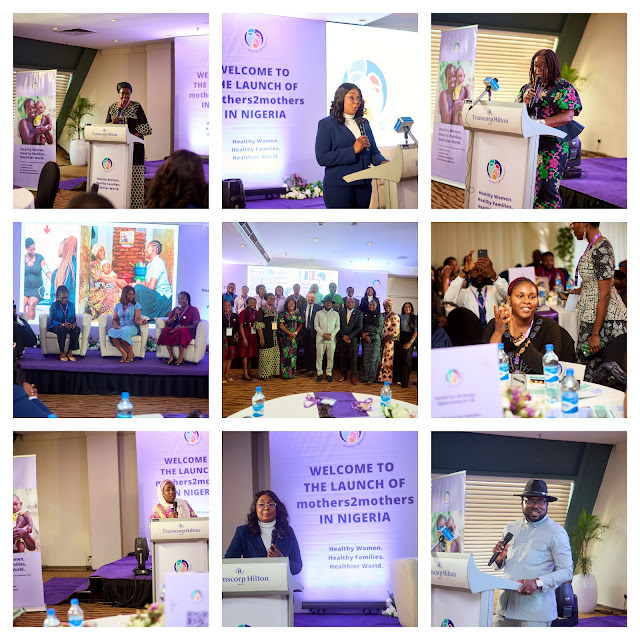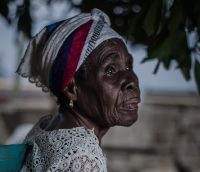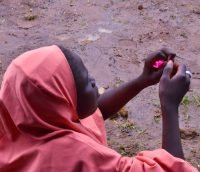 Dr. Chinyerem Immanuel, mothers2mothers Nigeria Country Director, at the launch of the project in Nigeria. Image Credit: jonecleverpatrick
Dr. Chinyerem Immanuel, mothers2mothers Nigeria Country Director, at the launch of the project in Nigeria. Image Credit: jonecleverpatrick
By Cynthia Umeh
We were honored to attend the official country launch of mothers2mothers (m2m) Nigeria in Abuja.
m2m, an African non-governmental organization dedicated to advancing maternal and child health, uses a unique model that trains and employs Mentor Mothers—women living with HIV—as community health workers. This peer-led approach ensures that vital health services reach under-resourced communities, with efforts centered in Bwari and Gwagwalada in the Federal Capital Territory.
At Shades of Us, our commitment to maternal and child health drives us to support such initiatives. We believe that a healthy foundation for mothers and children paves the way for stronger communities and a more resilient future.
Event Highlights
Welcome Address: Dr. Chinyerem Immanuel, m2m Nigeria Country Director
Dr. Immanuel welcomed guests with a passionate introduction to m2m Nigeria. She highlighted m2m’s comprehensive approach in family health services, explaining that Mentor Mothers provide education, health screenings, referrals, and community support in maternal, child health, and HIV care.
Keynote Addresses: Addressing HIV and Maternal Health Challenges in Nigeria
Dr. Miriam Ifeoma Nzekwe, Deputy Director, Health Policy, Advocacy and Health Systems Strengthening, National Agency for the Control of AIDS, (Representing the office of the Director General of the National Agency for the Control of AIDS), emphasized the role of HIV in maternal and child health outcomes. She stressed Nigeria’s commitment to reaching the 95-95-95 targets, which aim to ensure that 95% of people know their HIV status, 95% receive treatment, and 95% achieve viral suppression. Dr. Nzekwe highlighted the urgency of reducing HIV transmission rates and protecting children from HIV-related mortality.
Dr. Adebobola Bashorun, National Coordinator, National AIDS and STDs Control Programme, discussed the ongoing challenges posed by stigma, limited access to resources, and the need for more HIV services in primary health care. He underscored the importance of reducing mother-to-child transmission through prevention, peer education, and closer collaboration with local healthcare facilities.
Global Overview and Significance of m2m’s Launch in Nigeria by Frank Beadle de Palomo, m2m President and CEO
Frank Beadle de Palomo delivered a powerful address on the impact and vision of m2m globally, focusing on its significance in Nigeria. He presented key statistics to underscore the urgency of m2m’s work:
- HIV Prevalence and Maternal Mortality: Nigeria has an HIV prevalence of 1.3% among adults aged 15-49 and one of the highest rates of mother-to-child HIV transmission. This reality drives the need for innovative, accessible HIV and maternal health services.
- Why Nigeria?: Frank shared that m2m identified Nigeria as a critical location to expand its Mentor Mother Model due to the high maternal mortality rate (512 deaths per 100,000 live births) and limited healthcare access in rural areas.
- The Mentor Mother Model in Action: Frank elaborated on the Mentor Mother Model as a transformative solution, which employs mothers with lived experience of HIV to support others in similar situations. In Nigeria, this model will emphasize an integrated care approach, where maternal and child health services, including HIV care, are streamlined to create a continuum of support. Frank’s session stressed that empowering women to support each other not only enhances access to care but also fosters a supportive community that helps reduce stigma.
He concluded with promising projections, stating that m2m Nigeria aims to reach over 5,000 clients by the end of December 2024, with 30 new Mentor Mothers now deployed across 21 health facilities in Abuja. Frank’s message was one of hope and commitment, inspiring attendees to look toward a future of healthier, empowered communities across Nigeria.
Panel Discussion on Voices from the Frontlines
Moderated by Nozi Samela, Regional Communications Manager for Southern Africa, this panel provided a platform for firsthand stories from the field. Each speaker shared powerful insights into the realities of delivering healthcare services in underserved communities:
- Faustina Ocansey, Site Coordinator from Ghana: Faustina shared a personal story that captivated the audience. She spoke about her journey living with HIV, recalling a time when stigma nearly overwhelmed her: “I almost died from the stigma, not even from the disease.” Her words underscored the role of peer support in overcoming internalized stigma, encouraging women to seek help and support others in their communities.
- Ijeoma Umahi, Nigerian Mentor Mother: Ijeoma shared the challenges she faced in building trust within her community. Through her work as a Mentor Mother, she discovered that understanding cultural and language barriers was essential to providing effective care. Her experiences illustrated the importance of culturally relevant communication to reach women and children in need.
- Evelyn Orjingene, Nigerian Mentor Mother: Evelyn highlighted her experiences working closely with local healthcare providers to deliver coordinated support. She spoke of the value of financial stability for Mentor Mothers, stressing that sustainable pay for health workers is essential to maintaining morale and dedication to the cause.
Together, the panelists emphasized how the Mentor Mother Model not only addresses medical needs but also tackles social barriers, such as stigma and cultural misunderstandings, that hinder access to healthcare. They all agreed that ongoing support and community education are fundamental to the long-term success of m2m’s mission.
After the panel session we had an interactive online quiz segment. This segment allowed participants to test their knowledge on HIV prevention, maternal health, and the role of community health workers. Through this quiz, attendees engaged in an informative and entertaining way, reinforcing key messages about health awareness and stigma reduction.
Special Addresses
Dr. Ruggaya Wamakko, Executive Secretary of the FCT Primary Health Care Board, reiterated the board’s commitment to ensuring access to quality primary healthcare for all residents of the Federal Capital Territory. She highlighted the board’s focus on providing training for healthcare workers to deliver services for women and children effectively.
Dr. Fatima Daggash, State AIDS/STI Control Programme Coordinator for the Federal Capital Territory, emphasized efforts to prevent mother-to-child HIV transmission. She urged collaboration across all levels of society to support women and children affected by HIV, stressing that every individual’s efforts are crucial in the fight against HIV.
Closing Remarks: Dr. Chinyerem Immanuel
In her closing remarks, Dr. Immanuel thanked all speakers, attendees, and partners, reiterating m2m’s commitment to transforming lives in Nigeria through its Mentor Mother Model. She invited everyone present to join in supporting m2m’s mission, saying, “This journey requires each of us, working together, to create lasting change.”
The event concluded by allowing attendees to connect and discuss future collaborations to support maternal and child health in Nigeria.
As advocates for maternal and child health, we at Shades of Us were inspired by the m2m launch and the potential impact of the Mentor Mother Model in Nigeria. This approach resonates deeply with our belief in community-led solutions that drive long-term change.






